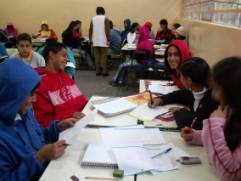Using students’ ideas to make teaching more inclusive, Brazil
Windyz Ferreira and Mel Ainscow
In Brazil, recent years have seen massive progress towards the United Nations’ goal of Education for All. However, while school enrolment has increased, the challenge remains of how to develop practices that will enable all children to learn effectively. This reminds us that ‘schools for all’ is not the same as ‘education for all’.
Recently we co-ordinated a project aimed at developing inclusive practices in a group of state schools in São Paulo. This was a joint project in partnership with the University of Manchester and funded by the British Council.
As part of the project we interviewed adolescents enrolled in various high schools, asking them what they liked best about their teachers and what they considered to be good teaching. Their responses provided helpful leads as to what now needs to be done to make their schools more inclusive.
For example, students commented:
- “I like teachers that listen to us!”
- “We like teachers that explain over and over a few topics that we are facing difficulties understanding.”
- “The best are those lessons that are interesting: that is, we can talk with our colleagues about whatever we are learning… it is boring when we have to be there, just sitting, looking at the teacher and making notes while he/she is speaking and writing on the blackboard.”
- “Practical lessons are nice, I like them because I can learn better if I do things and see how things happen.”
- “Issues that are part of our lives are better to learn and to get interested, rather than those weird things that do not mean a thing to us…”
Comments such as these clearly show that students have helpful ideas as to how lessons can be made more effective for them. They lead us to argue that by listening to the ideas of students, teachers can be encouraged to re-think their teaching styles in order to reach out to more students in their classrooms. In this way, they will be better prepared to review the focus and priorities for their lessons, and better able to answer vital questions such as:
- Is this lesson content relevant to my students?
- Will they be interested in the kind of activities I am planning?
- How can I make the lesson more dynamic and interactive?
In the schools in our project we saw very encouraging evidence of the potential of this approach. In particular, we saw how groups of teachers were stimulated to experiment with new teaching strategies as a result of their discussions of the ideas generated by their students.
Unfortunately, there are barriers that have to be overcome. Some of these are organisational. For example, teachers in Brazil are forced to work very long hours, often in more than one school, and are very poorly paid. However, other barriers are to do with attitudes. For example, I have heard teachers say:
- “Children are not able to offer contributions… they are too little.”
- “Students in mainstream schools are too poor, too deprived, have no rules, so they can’t possibly have an idea about what is best for them.”
- “Students can’t understand why we do things in this way.”
- “Young vulnerable people are not in position to have a say about how a teacher should teach, or what is a relevant curricular theme for them”.
Such beliefs about the limited role that children and young people can play in their own learning processes create a deep communication gap between teachers and their students. This can stifle the sense that ‘we all learn better if we collaborate with one another.’
The way forward, therefore, must be to create the working conditions in which teachers feel encouraged to learn from one another and, most importantly, to learn from their students.
Windyz is Senior Lecturer at the Federal University of Paraiba and a researcher in the field of inclusive education. Contact her at: windyz_ferreira@hotmail.com or via EENET. Mel is a Professor of Education in the University of Manchester. Contact him via EENET.

